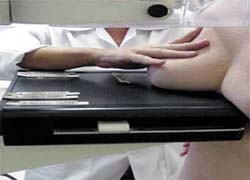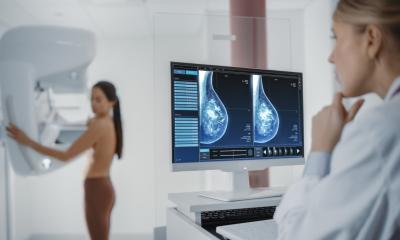Spain
About 50% of 40-70 year-old women have been screened.
Dr Eduardo de la Sota reports

Randomised trials in Europe and the USA have shown the benefit of screening women ages 40-70 years. Encouraged by the success of these trials, many Scandinavian countries now offer screening mammography to their populations as a public health service. These service screening programs have reduced breast cancer deaths as much as 63% among women who were screened. In the US, where 61.5% of women age 40 and older report having had a mammogram in the preceding year, death rates from breast cancer have been falling despite an increasing incidence of the disease. The American Cancer Society recommends that annual screening mammography begin no later than age 40 years, as Stephen Feig, at the Department of Radiology, University of California, points out.
In Germany, for example, S Diekmann has revealed data that suggests the early detection of breast cancer by mammography screening can reduce mortality by about 25%. Intensified monitoring of women with a family history of breast cancer and regular general screening have recently been introduced in Germany. The screening programme is expected to be fully established by 2008. Following its successful introduction (participation rates between 65 and 80%), the German screening program will be conducted and evaluated in accordance with the European guidelines.
Interesting conclusions concerning Mammography use in Spain arise from the Agencia de Evaluación de Tecnologías Sanitarias (Health Technology Assessment Agency), Instituto de Salud Carlos III (Institute of Health Carlos III), Madrid, Spain. They conducted a cross-sectional population survey of a representative sample of women aged 40-70 (2,409 women).
Data collection took place using a questionnaire addressing the dependent variable (mammography use) and the independent variables (socio-demographic and socio-health factors, and women’s knowledge and attitudes). Mammography use was defined as having received at least one screening test in the previous two years.
In conclusion, after the introduction of screening programmes, almost half of Spanish women aged 40-70 had received mammography. Invitation to screening, visit to a gynaecologist and women’s attitudes are the main reasons for undergoing tests. Women over 65 years of age and/or those in a lower socio-economic level warrant special attention.
In Spain, most of the screening programmes using mammography begin at age 50, but some communities, like Navarra and Valencia, are starting at the age of 45. The programmes include women up to 70.
31.12.2007





